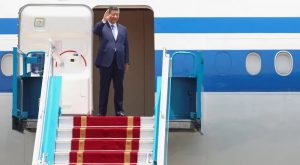China has completely shut down its exports of seven rare earths — and magnets made using them — to the United States, while also cautioning Donald Trump against his reported plans to stockpile deep-sea metals.
The seven rare earths — samarium, gadolinium, terbium, dysprosium, lutetium, scandium and yttrium — have not been shipped from Chinese shores since April 4, when it announced restrictions on their exports in retaliation to Trump’s first round of so-called ‘reciprocal tariffs’.
Chinese exporters must now apply to the Ministry of Commerce for licences to ship them, Reuters reported citing sources familiar with the matter.
Also on AF: Tariffs on Imported Chips to be Announced Soon, Trump Says
The licensing process, however, is largely opaque and often involves long timelines. It can take between six to seven weeks, and even several months before any licences are issued, Reuters said.
“When asked by my clients when their cargoes will be able to leave China, we give them an estimated time of 60 days but it may actually take longer than that,” one China rare earth trader told Reuters on condition of anonymity.
Furthermore, whether any of those licences will allow shipments to reach American shores remains to be seen, and could be unlikely until the trade war between China and the US shows any signs of cooling.
It is worth noting that China has not exported any shipments of the rare earth antimony to European Union countries since it put the metal on a control list in September. That move was in retaliation to the bloc’s decision to levy tariffs on imported Chinese electric vehicles.
In much the same way, Beijing is now completely clamping down on shipments of the now-restricted rare earths to the US. According to a report by the New York Times, Chinese customs officials have stopped most exports of heavy rare earth metals and magnets to all countries.
‘Severe effects in the US’
Some Chinese ports are allowing exports of magnets if they only have small traces of heavy rare earth metals in them, and if they are not headed to the US, NYT reported. Other ports, meanwhile, are requiring stringent testing to prove none of the magnets being shipped have heavy rare earth metals in them, it added.
The development points to the continuing escalation of an ongoing trade war between the world’s two biggest economies, which now also threatens to upend global supply chains for key technologies such as electric vehicles, chips, drones, robots and missiles among others.
The restricted heavy rare earths and the magnets made out of them are critical to the production of these technologies. And, going by the NYT report, American military contractors are particularly worried.
“Drones and robotics are widely considered the future of warfare, and based on everything we are seeing, the critical inputs for our future supply chain are shut down,” James Litinsky, the executive chairman and chief executive of American miner MP Materials, told NYT.
Daniel Pickard, chairman of the critical minerals advisory committee for the United States Trade Representative and Department of Commerce, also confirmed to the NYT that China’s export bans could “potentially have severe effects in the US.”
Warning on deep-sea metals ‘stockpiling’
Despite China’s export bans, however, Trump has, since April 4, increased levies on Chinese goods several times. The latest tariffs stand at an eye-watering 145%.
Chinese rare earths exports are not exempt from those levies, even though the US depends largely on them for key industries — just like most countries around the world.
On Saturday, the Financial Times reported the Trump administration was drafting an executive order to enable the stockpiling of deep-sea metals to counter China’s dominance in battery minerals and rare earth supply chains.
Under the plans, the stockpile would “create large quantities ready and available on US territory to be used in the future”, in case of a conflict with China that might constrain imports of metals and rare earths, the report said.
On Monday, however, China’s foreign ministry said no country should bypass international laws to authorise resource exploration in the seabed, responding to the report.
Under international law, the seabed and its resources “are the common heritage of mankind,” the ministry said.
“Exploration and exploitation of mineral resources in the international seabed area must be conducted in accordance with the United Nations Convention on the Law of the Sea and within the framework of the International Seabed Authority,” it added in a statement.
‘Minimal’ pain for China
China produces some 90% of the world’s rare earths and is the dominant supplier of the vital elements to users around the world. Until 2023, China supplied 99% of the world’s heavy rare earth metals, according to NYT.
A refinery in Vietnam also accounted for a minuscule chunk of their supply, but it has been shut over the past year due to a tax dispute, NYT added.
Meanwhile, China also supplies 90% of the world’s rare earth magnets that are critical to assembling everything from cars to missiles. Japan and Germany produce the remaining 10% but are dependant on China for raw materials, NYT reported.
Last month, China’s rare earth exports jumped more than 20% amid concerns around supply disruptions in Myanmar, where armed rebels seized a key mining belt in October.
The issues in Myanmar coupled with Chinese restrictions mean supplies of more than 75% of global mined medium and heavy rare earths are now at risk.
“While stockpiles may cover near-term demand, our estimates suggest that they will only suffice until the first half of 2025,” Neha Mukherjee, senior analyst at Benchmark Mineral Intelligence, told Reuters.
The disruptions could also potentially spike prices of rare earths in the short-term Mukherjee noted.
While the situation creates immense risks for the world’s tech supply chains, the impact on China will be minimal, considering rare earths and magnets made from them make up a small share of the country’s overall exports to the US and the world.
It would, however, chip away at China’s rare earth dominance as it would force overseas buyers to accelerate their diversification away from China, even if that process is likely to be lengthy.

- Reuters, with additional editing and inputs from Vishakha Saxena
Also read:
China Calls For US to Scrap Its Tariffs as Xi Starts SE Asia Tour
China Lifts Tariff on US Goods to 125%, as ‘Hikes Become a Joke’
US And China ‘Stuck in an Expensive Game of Chicken’ – Nomura
Xi Calls on Foreign CEOs to Help Protect Supply Chains
China, Japan, South Korea Boost Trade Ties, as US Tariffs Loom
China Curbs Hollywood Films, But Says It’s Open to Talks
Video Gamers Angry About Impacts of Trump Tariffs
Chinese Mine Blamed For Zambian River Pollution Crisis – AP























